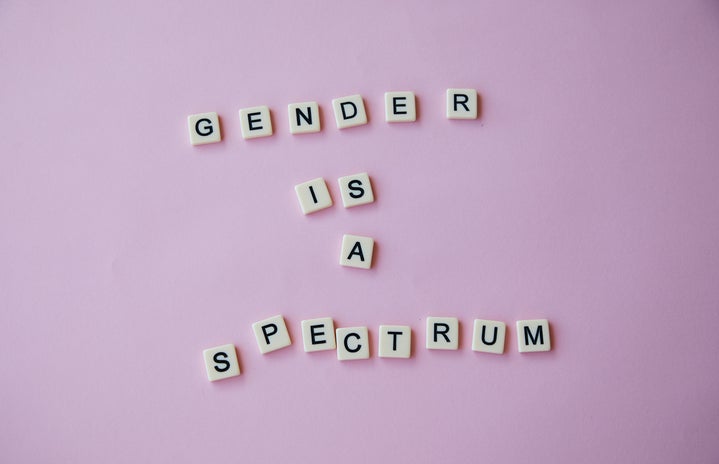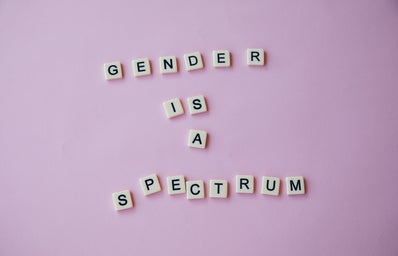Last week, genderfluid hairstylist, David Lopez, hosted transgender influencer, Dylan Mulvaney, on his Ulta Beauty-run podcast, The Beauty of…. A digital campaign run by Ulta that discusses and expands the narrow parameters of modern beauty standards. So far, they have released an episode on fatness, and now Mulvaney’s episode, called “The Beauty of…Girlhood.” I could write another essay entirely about the optical allyship of large corporations preying on our pathos with virtue-signaling campaigns, and I certainly didn’t think I would be writing this essay in defense of one. However, after seeing the media backlash that Ulta Beauty faced for featuring two LGBTQ influencers in a discussion of womanhood, I can be a cog in their machine for at least a few paragraphs.
The predominantly cisgender female audience was outraged by two biological males sharing their experience with femininity. This caused them to trend #BoycottUlta on Twitter, along with an extremely transphobic #womanface, which not only degrades the significance of blackface, but also implies that trans women and non-binary people present womanhood as a costume. Users are making accusations of Mulvaney and Lopez’s apparent misogyny and mansplaining as a social shield to spew transphobia. To fully understand why this backlash is so misguided, we must analyze both gender theory, and the ‘theories’ of the ‘gender critical.’
Judith Butler, a prominent gender theorist, makes incredibly powerful arguments in her famous essay, “Performative Acts and Gender Constitution: An Essay in Phenomenology and Feminist Theory.” This work was published in 1988, when third wave feminists were pushing political campaigns to find unity in the definition of womanhood. In other words, they wrongfully sought solidarity within the standards that oppressed them, rather than sought to be emancipated from these standards completely. Granted, the abolition of the oppressive framework that our society functions within is a utopian project, but we cannot take steps in this direction while still treating womanhood as a prescriptive identity. Butler’s work is incredibly dense, expansive, and impossible to summarize within a single article, but some of their overarching ideas are relevant to this conversation. Specifically, their famous statement that, “gender is in no way a stable identity or locus of agency from which various acts proceed; rather, it is an identity tenuously constituted in time—an identity instituted through a stylized repetition of acts.” Essentially, gender is not established biologically, but through the performance of our gender roles; gender roles that are fluid and inconsistent across history and different cultures. Mulvaney and Lopez have been accused of mocking, caricaturing, and degrading women by ‘treating femininity as a costume.’ Using Butler’s theory of gender performance, I would argue that femininity is a costume. These women are not angry at campy femininity, they are angry to see a reflection of the calculated feminine ideal that they internalize. There is no original man or woman to derive our schemas of gender from, which proves that gender is a social construct. Cisgendered women have the privilege to perform unconsciously, under the false, but accepted notion that gender expression is an innate quality. Cisgender and transgender women are making the same choices, but the divide is within their levels of consciousness.
Admittedly, when I first heard the term trans-exclusionary radical feminists, abbreviated as ‘Terfs’ in conversation, I misunderstood it as a reference to the “turf war” they create around womanhood rather than an acronym. These women use the terms ‘gender critical’ or ‘radical feminism’ to mask transphobia, and condemn hyper-feminine trans women for conforming to oppressive standards.
Though I don’t sympathize with their cause, I can understand how their ideology was formed. If you have been shamed for lacking femininity and wished for the abolition of gender stereotypes, it can be troubling to see transgender women idolize these standards. This argument is broken in that trans women don’t claim to equate womanhood and femininity. In fact, the trans experience is founded on the separation between sex and gender. We should consider how trans individuals must use their presentation to control how they wish to be perceived and addressed. Trans-identifying people can present however they choose, but it can also be a necessary, precautionary act to avoid being misgendered or hate crimed.
Furthermore, this critique is hypocritical because cisgender women rarely face backlash for exercising their femininity. In theory, the Terfs would be spewing hatred towards any woman who does an Ulta Beauty campaign for promoting the aesthetic of womanhood. Terfs are not offended by hyper-femininity; they are offended by trans womens’ existence.
A lot of the frustration around Mulvaney and Lopez discussing girlhood stems from the narrative that the female condition is defined by pain. Pain that must be ingrained in us from an early age. Pain that perpetually follows us throughout our lives, never ceasing, but only changing forms. Pain that is generational and essential to a woman’s existence. This perspective of womanhood, bound by reproductive capacity and trauma, is exclusionary to trans women and cis women alike. Not all women can bear children and menstruate. Not all women have faced excruciating misogyny throughout their entire lives. We don’t have the language to define womanhood, and any attempt to do so only reduces it to perpetual suffering. Is this really how we want to perceive femininity?
In the face of reproductive oppression, it makes sense that many women celebrate their own reproductive anatomy. However, it is no longer a feminist act once it becomes exclusionary. In the episode, Dylan Mulvaney talks about how she hopes to one day be a mother and have a family. Terfs immediately rebutted this dream, claiming that she “will never be a woman” and “absolutely can not be and never will be a mother.” We can’t complain about patriarchal expectations, such as women’s obligation to be mothers and caretakers, while simultaneously designating these expectations as quintessential to our identity.
The obsession with equating girlhood with pain has caused women to treat their brutalization as a badge of honor. Terfs claim that transgender women can’t understand misogyny if they were not always socialized and sexualized as a woman. Cis women and trans women are subjected to the same oppressive structures, and the life stage in which this occurs is irrelevant to the damage it causes. It is unproductive and invalidating to compete over degrees of victimhood.
While trans and cis women should find common ground in their struggles, there is also space to adknowledge how their experiences of womanhood are different. We are both affected by violence, legislative injustice, and the failures of the healthcare system. Cis women may have the additional hardship of being exposed to misogyny from birth, but there is a multitude of additional hardships faced exclusively by the transgender population. They’re susceptible to medical complications if they choose to transition, gender dysphoria, and have been victims of conversion therapy. Their population also has one of the highest rates of suicidal thoughts, suicide attempts, and violence victimization. Transgender people don’t use their unique struggles to disqualify the struggles of cisgender people, because again: we do not have to create a competition of who is more brutalized by society.
The purpose of Ulta’s podcast is to highlight beauty through a lens of intersectionality. I acknowledge that ultimately, this is a large corporation that is motivated by profit, not morals. Regardless, it’s important to amplify trans and queer voices, as their innovation and creativity has shaped the beauty industry. Trans visibility doesn’t alienate cis women, the same way that one woman’s beauty does not take away from anothers.
This topic is incredibly nuanced, which is why we retreat to the comfort of black and white thinking rather than challenge our biases. Terfs want Mulvaney and Lopez to go through the seven rings of misogynistic hell in order to earn the aesthetic of femininity, but womanhood isn’t defined by these parameters of oppression and appearance. To me, womanhood is a concept that cannot be reduced to a definition. It’s the five-minute soulmate connections I form with other girls in the bathrooms of parties. It’s the way I feel other women’s joy and empowerment as my own. It’s a bond that is stronger than all the inherent suffering of the female condition. Trans women’s unfleeting resilience in the face of discrimination has represented my understanding of womanhood better than any of the women who have shamed them. The fight for equality will be void if we let our years of oppression turn us into oppressors.


